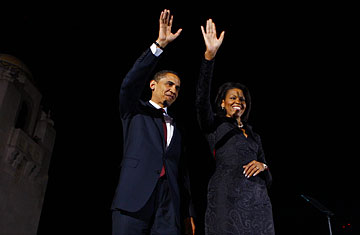
Barack Obama and his wife Michelle Obama wave to supporters at the candidate's primary night rally in San Antonio on March 4
Hillary Clinton may have won Texas and Ohio last night, but to hear the Obama campaign tell it, nothing has changed. According to them, Obama has won nearly twice the number of states she has and he leads in the popular vote and in pledged delegates. "Nobody will get to 2,025 but somebody will be the leader," said Obama's chief strategist, David Axelrod, referring to the 2,025 delegates needed to cinch the nomination. "And it's very clear in the process so far that we are that leader. The lead that we have hasn't been diminished in any real way."
But while the math may not have noticeably shifted—Obama will likely have close to the same hundred-plus delegate lead he enjoyed before Tuesday—there is little denying that the narrative of the race has been altered. The banner headline on Clinton's website—"MOMENTUM: KEEP IT GOING"—said it all. By defying expectations with convincing victories in two major states, Clinton will likely be able to quiet the calls for her to withdraw from the race and focus her energies on the next big primary, Pennsylvania, on April 22. If Clinton wins there she can at least try to claim that she alone won all the "big" states and has the best shot at winning the general election—an argument she would surely use to try to convince Democratic superdelegates to help her secure the nomination.
"Pennsylvania will be her next big hope, where she should do well with its numbers of Catholics, older voters, and labor," said Stephen Schneck, a political science professor at Catholic University. "But, even with a 55-45% split in Pennsylvania going to Clinton, it does not appear today that she would have enough delegates to claim the nomination."
One thing is almost certain: In the seven weeks leading up to Pennsylvania, the campaign will continue to be a nasty affair, and Obama will have to find a better way to fend off Clinton's attacks on such issues as national security and NAFTA, which many think helped her surge in the last few days leading up to Texas and Ohio. "They're very quick to ask questions but we still don't have the tax returns. We still don't have the records from the Clinton library," Axelrod said. "There are many questions that they haven't answered for all their yammering about how unfairly they've been treated. What's good for the goose is good for the gander."
Not surprisingly, there are some in the party that don't want to see the divisive race stretch on for another couple of months. "If the Democrats are lucky there'll be an intervention by Al Gore and some senior party people to negotiate the peace," said Larry Sabato, a politics professor at the University of Virginia. "The senior party members would organize the superdelegates, enforce it not personally but through other emissaries, to produce 2,025 delegates for a certain candidate, likely Obama. Edwards has missed his moment to do this. It would've been former President Clinton but he's otherwise committed, so you're left with Gore."
Still, if Gore doesn't come to the rescue, Obama isn't ready to change his style of campaigning just yet. "Look, they have run a pretty negative campaign over the last couple of weeks. I have said consistently that we do things differently. It's worked for us so far and you know I�m not gonna do things that I'm not comfortable doing and I want to make sure that we stay focused on the issues," he told reporters.
